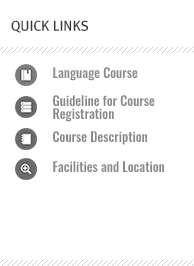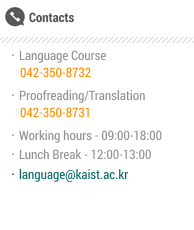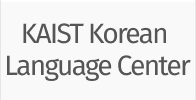| 1 |
- Developing minimal communication skills necessary for daily life.
- Learning the basic structure of Korean to understand and use short sentences
- Learning language skills necessary in everyday activities such as greetings, self introductions, ordering food, purchasing goods, making phone calls, and using public transportation.
|
Hi!
Korean 1A, 1B |
| 2 |
- Developing basic communication skills necessary for daily life.
- Being able to understand and use relatively longer sentences made by connecting and expanding short sentences.
- Able to converse on familiar topics such as family, hobbies, seasons, travel, experiences, festivals etc.
|
Hi!
Korean 2A, 2B |
| 3 |
- Developing communication skills necessary for ordinary social activities and experiencing Korean culture.
- Being able to hold everyday conversations freely by learning sufficient vocabulary, hanja words, and idioms.
- Able to express oneself on various topics such as getting a flat, moving house, requesting repair services, planning vacations, acting a play etc.
|
Hi!
Korean 3A, 3B |
| 4 |
- Develop communication skills necessary for various social activities and experiencing traditional and modern Korean culture.
- Able to express one’s own opinions in a refined manner on discussions of various societal and personal issues such as the function of mass media and views on marriage.
- Able to read and understand content on societal and abstract issues, and appreciate Korean literature such as poetry, essays and novels.
|
Hi!
Korean 4A, 4B |
| 5 |
- Develop the skills to communicate smoothly in various situations and gain a broader understanding of Korean culture.
- Able to read newspaper articles, advertisements, critiques etc. on current affairs topics and write on various topics.
- Able to logically express one’s opinions and positions on a wide range of topics such as social issues, the economy, history, culture etc.
|
Hi!
Korean 5A, 5B |
| 6 |
- Develop fluent Korean language skills needed for professional and social activities as well as academic pursuits, as well as in-depth understanding of the Korean language and culture.
- Able to present and discuss logically on professional topics using advanced vocabulary.
- Able to listen to and understand a wide range of audiovisual materials such as the news, public service announcements, lectures, conversations etc..
|
Hi!
Korean 6A, 6B |













